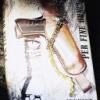In 1966, two British literary giants reviewed Ian Fleming's posthumously-published collection featuring the short stories OCTOPUSSY and THE LIVING DAYLIGHTS.
Anthony Burgess, the author of A CLOCKWORK ORANGE and a rejected screenplay for THE SPY WHO LOVED ME, wrote a very short review of the collection that was published under the heading 'New Fiction' in The Listener on 14 July 1966. It was only a paragraph long, the last review in a piece that also looked at works by Marguerite Duras, Peter de Polnay and Colin Spencer. Here's the whole review:
'The last of Ian Fleming: two stories which, in their fascinated poring on things - guns, techniques, foodstuffs - remind us that the stuff of the anti-novel needn't necessarily spring from a thought-out aesthetic; it is the mastery of the world as things rather than people that gives Fleming his peculiar literary niche. I admired all the Bond books and I'm sorry there'll be no more. A sad farewell to Fleming and, while I think of it, to my own readers. Here on the novel-page of THE LISTENER, I mean. At least I hope only that.'
The review by poet Philip Larkin - titled 'Bond's Last Case' - appeared in The Spectator on 8 July 1966. I don't have the whole review, but here are the first two paragraphs:
'These two stories, according to the blurb, were written in 1961 and 1962 respectively, and would have formed part of a similar collection to FOR YOUR EYES ONLY if the late Ian Fleming had lived to add others to them. As it is, they presumably represent the last hard-core splutterings of his remarkable talent. I am not surprised that Fleming preferred to write novels. James Bond, unlike Sherlock Holmes, does not fit snugly into the short story length: there is something grandiose and intercontinental about his adventures that requires elbow-room, and such Bond examples of the form as we have tend to be eccentric or muted.
These are no exception. It would be difficult to deduce from them the staggeringly gigantic reputation, amounting almost to folk-myth, that has grown out of the novels. Indeed, it would be difficult nowadays to deduce it from the novels. No sooner were we told that the Bond novels represented a vulgarisation and brutalisation of Western values than the Bond films came along to vulgarise and brutalise - and, in a way, sterilise - the Bond novels. With our minds full of Sean Connery in Technicolor, or whatever it's called now, the study of a retired Secret Service major drinking himself towards his final coronary, and its cover-mate, an assignment for 007 in Berlin to out-snipe a sniper, seems sensitive, civilised, full of shading and nuance.'





